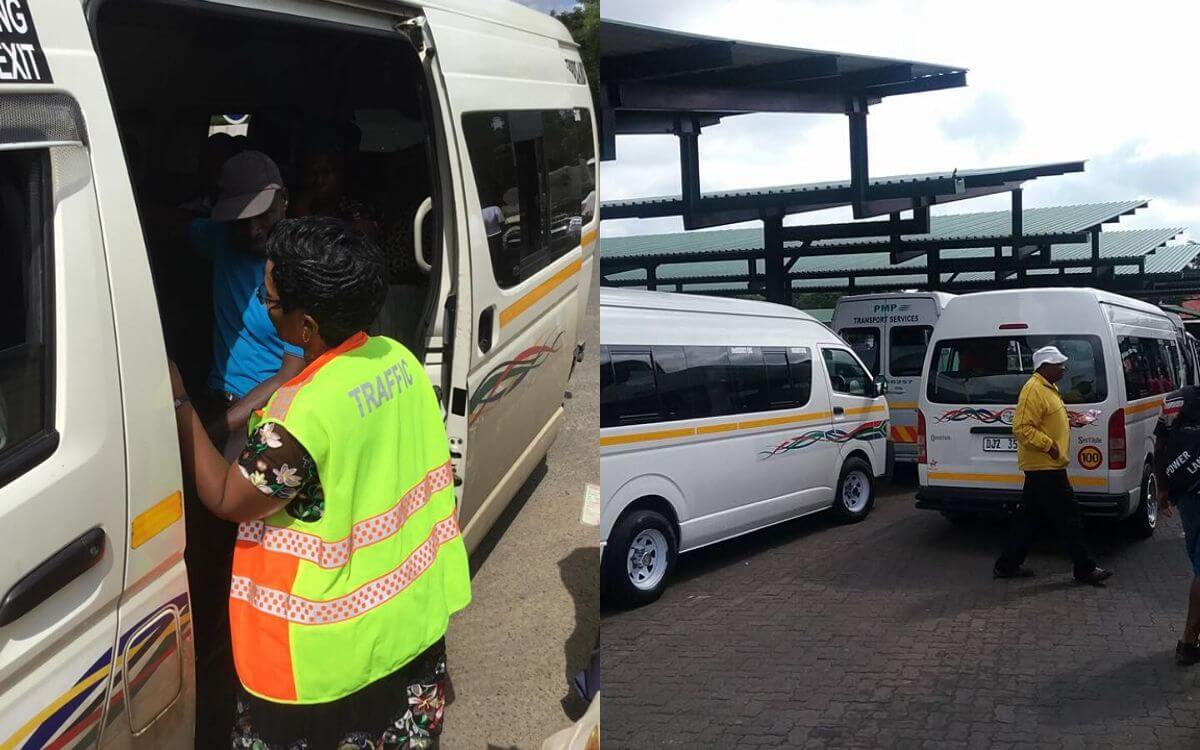
The Department of Transport says on its website that the taxi industry is an over R90-billion per annum industry, with about 200 000 taxis, that employ approximately 300 000 direct and indirect job opportunities, which include drivers, taxi marshals and administrative support.
According to Profitable Venture, there are niches within the taxi industry which include children’s taxi services, health taxis, water taxi services, a car rental, a limousine service and a minibus taxi.
Maroba Maduma, communications executive at SA Taxi, shares the ins and outs of starting a taxi business in South Africa.
Industry Overview
According to Maroba Maduma, communications executive at SA Taxi Foundation, minibus taxis are the dominant mode of public transport.
“While rail and bus networks serve as a trunk service in parallel with minibus taxis, minibus taxis are a key feeder into these services – transporting passengers their first and last mile.
“The mini-bus taxi operators are under quite a lot of financial strain with the increasing costs of operating their businesses,” says Maduma. SA Taxi is an independent financer of minibus taxis and a developmental credit provider. Their areas of focus include developing the taxi industry and ensuring its sustainability.
“The current lack of a government subsidy has been mentioned in a Competition Commission report and it would seem that the relevant ministries will be putting in the work to help this critical industry to thrive.”
Initiatives by the government include the Taxi Recapitalisation Programme. Last year Minister of Transport Fikile Mbalula announced that the government has reintroduced the programme that will see old and unroadworthy taxis being scrapped at sites across the nine provinces over five years.
According to the South African Government News Agency, the Taxi Recapitalisation Programme allows taxi owners to be compensated with R 124 000 for each taxi demolished through the programme, an increase from the previous R 91 100. The programme caters for taxis manufactured before 2007, with the government aiming to eliminate 135 894 such vehicles.
On its website, the Department of Transport says it will be reviewing the Taxi Recapitalisation model to improve its effectiveness and affordability. Expenditure on the review is projected at R 188,5 million over the medium term (2015/16 to 2017/18).
Key Trends
Maduma says that SANTACO is willing to introduce more tech into the industry. “There have been businesses that have tried Wi-Fi in the ranks and in the taxis, some are still doing it.
“There are also talks around electronic payment, with a successful proof of concept having been done in the Gauteng area as soon as last year.”
Maduma also says that advertising on and in the taxi is something that has also been tried in various forms. “Other pilot projects are being run to see the commercial viability, the logistical capability from a national roll-out perspective as well as the experience for the commuter.”
We’ve also seen the launch of Apps like AftaRobot, a transport management technology platform.
Opportunities
In a previous interview with SME South Africa, Maduma said they have a skills certification for taxi rank technicians, Project Refentse, which “upskills young mechanics by giving them formal theoretical and practical training, but also by providing them with tools for carrying out their trade when they are done with the course”.
SA Taxi has also previously provided incubation support services to meter taxi owner-drivers and supported local emerging artists and designers through the SA Taxi Foundation.
Maduma also said that eager young people should take advantage of opportunities within the industry, from mobile payments and access to information for customers to fleet management and revenue tracking and safety.
He added: “In addition to the need for trainers, accountants, and management specialists, there is enormous scope for IT, marketing, business development, and business innovation professionals who can grow the industry into the future.”
Maduma also said that with the world growing into a globalised, self-service, on-demand, data-driven and customer experience-dominated environment, there will also be a need for daring, business-minded people, who can design management tools for taxi fleet owners, human resource strategies specific to this fluid industry, route management technology etc.
Getting Started
According to Maduma, to start a taxi business, taxi operators must first be a part of an association in order to gain access to a route and operating licence. “Taxi operators pay a fee to join an association which enables the operator to apply for an operating licence.
“Taxi associations self-regulate the servicing of routes to ensure routes are not over supplied and that minibus taxis can operate profitably. There are currently about 1 200 taxi associations in South Africa.”
Maduma also says that associations are awarded the right to operate a route by the provincial regulating entity (PRE) through a registration process. “Route allocations are managed by the Registrar’s Administration System (RAS).
“The RAS system registers taxi operators, taxi associations and details of their operations, including routes. The PRE determines the number of operating licences to be issued per route based on an integrated transport plan which considers the spread of scheduled and unscheduled services required across various transport modes.”
According to Maduma, operating licences, issued by the Operating License Administration System (OLAS), authorise an operator and vehicle to provide a specified transport service.
To apply, prospective operators must provide the following:
- Association motivation
- Route description details
- Driver’s license
- Vehicle registration certificate
- Roadworthy
- Tax registration number

Taxi Business Laws and Regulations
Maduma says the taxi industry is a self-regulated industry. “Licences (mentioned above) are tied to an operator, vehicle and route and expire after seven years, but can be renewed based on roadworthiness, compliance and a review of the route.
“Operating licences can be transferred between operators and are therefore tradable. However, the licences do not hold significant value and are not commonly traded.”
Set-up Costs for a Taxin Business
Buying the Vehicle
In order to purchase a mini-bus, an aspiring operator will need to have money for a deposit, says Maduma. “The amount ranges depending on the customer risk profile and the value of the vehicle being purchased.
“The deposits can range from a zero deposit (in rare cases) all the way to R 150 000 if the asset is quite expensive.”
Monthly Running Costs
A taxi operator has to pay for fuel and oil, service of the asset, changing of tyres and other asset maintenance-related costs.
There are also association fees that must be paid on a monthly basis.
Location
According to Maduma, location is very important for taxis. “It has to be easily accessible, central, and close to essential amenities and businesses.
“There are some routes that are more profitable than others, meaning competition to get onto those routes is quite high. One however cannot simply choose to start operating on a brand-new route as expressed in the answer above on how these are regulated.”
Maduma suggests that you enquire about your preferred route from the local association. “However, your ability to get onto a route depends on the availability of routes in that area and the willingness of the association in that area to take on new operators. This is regulated by the relevant association.”
Route Description Detail
There are short-distance and long-distance routes. “Each of these has a starting point and an endpoint (an example used for a short distance is a 23 km route from Soweto to Johannesburg),” explains Maduma.
“Depending on the route, there will be different associations, different executives that are responsible for that route and give permission to operate on the route, different association costs to that route etc.”
Sales and Marketing
Depending on the routes, the average profit that a mini-bus taxi operator who does short distance can make per month is R 25 000 and for long distance, the average profit is R 37 000 per month.
Maduma says SA Taxi predominately uses direct marketing to reach its customers.
“Flyer drops at the ranks and at taxi associations have so far been a very effective way of getting customers to know more about our products.
“There is also online marketing which works for us, as well as the biggest draw card, word of mouth,” he says.
“A lot of our business comes from repeat customers that are happy with our service and offerings, so normally they come back to us whenever they want to grow or maintain their businesses.”
Challenges in Taxi Business
Maduma says when the economy shrinks and fewer people have a need to get from place to place, the industry suffers. “The rising operating costs such as increases in fuel prices and cost of parts, puts a lot of stress on the earnings of the operators.
“To survive some of these challenges, some operators have deals with private sector companies and act as staff transporters for them, they also use their vehicles as mobile billboards and allow brands to advertise on them.”
Maduma says SA Taxi, through its rewards program, has partnerships with fuel companies helping the operators get fuel rebates, as well our partnership with Bridgestone which makes an OEM (original equipment manufacturer) grade tyre specifically for the taxi industry at a much more affordable price.
“These types of initiatives and others not mentioned here are efforts by us and the operators to keep the businesses sustainable,” says Maduma.
COVID-19-related Challenges
According to the South African Government News Agency, during the lockdown period, public transport vehicles must reduce the number of maximum passengers to 70% of the licensed capacity, with no masks.
Alternatively, all minibus and midi-bus taxi vehicles are permitted to load their maximum 100% passenger loading capacity as provided for in their operating licenses, provided that all passengers are wearing masks. The masks must be either surgical masks or N95 respiratory masks.
South Africa’s 21-day lockdown started on 27 March 2020 and it was extended until the end of April 2020.
In light of COVID-19 and the lockdown’s challenges, Maduma says that in adhering to the measure set by the Minister of Transport, taxi operators that are operating during this period are limited to 70% capacity in their vehicles and restricted working hours.
“They are doing this whilst keeping the cost per seat the same, which means that they make less per trip at the same cost per trip as they would have made at full load,” explains Maduma.
“Their expenses haven’t gone down as significantly as their ability to earn has during this period.”
In regards to making sure the passengers are wearing masks, Maduma says it is not clear who will be supplying the masks for the passengers. “SA Taxi has donated R 3 million towards the purchase of masks and sanitisers in an effort to help the commuters and taxi drivers keep safe during this time.
“SA Taxi will also be providing our employees with masks during this period and we call on other employers of essential service workers to contribute towards the masks to protect their own employees from infection while traveling to work.”
Training and Support
According to Maduma, an aspiring taxi business operator would have to approach the association for assistance and guidance. “The most important part of this business is understanding how the industry is structured and operates; this information resides within the associations themselves.
“Then there is a need to acquire the asset and for that, one then needs to have a deposit. SA Taxi funds the operators in the form of vehicle finance for the minibus, however, the deposit is something that the operators will have to come up with themselves.
“The majority of new operators in the industry are former drivers who understand and have worked in the industry for a while,” Maduma explains.
Organisations to Follow
- Department of Transport is responsible for the regulation and coordination of transportation in South Africa.
- South African National Taxi Council (SANTACO) is the governing structure of the taxi industry.
- National Taxi Alliance (NTA) is an alliance of independent taxi associations.
- The South African Transport Allied Workers Union represents the labour force and its activities vary from province to province.
- Transport Education Training Authority provide an innovative Quality Assurance and Skills Development Framework in a cost-effective manner to exceed stakeholder/government Service Level Agreement (SLA) and requirements.
- Arrive Alive is a road safety campaign.
Start-up Advice
Here is Maduma’s advice for those who want to start a taxi business in South Africa:
1. Get advice from those who have successfully been in the industry for many years.
2. Save money for the deposit to purchase the minibus taxi.
3. Choose your vehicle wisely, some brands do not have the tenacity to put up with the gruelling demands of the taxi industry.
4. Approach a financier who sees you as a businessman – this is to ensure that you have the required business support.
5. Choose your route wisely.
6. Be prepared to spend many hours working, this is how any entrepreneur makes a success of themselves – put in the hours in order to grow.
This article was previously published on our website and has been republished due to its popularity.










